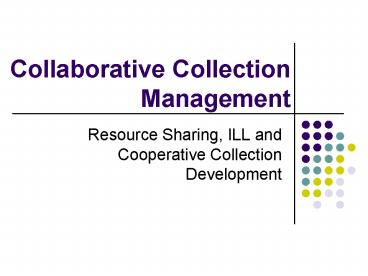Collaborative Collection Management - PowerPoint PPT Presentation
1 / 21
Title:
Collaborative Collection Management
Description:
... Collection Development. 3 key components to cooperation around collection ... OCLC Collection Analysis - compare what your library is borrowing and lending ... – PowerPoint PPT presentation
Number of Views:54
Avg rating:3.0/5.0
Title: Collaborative Collection Management
1
Collaborative Collection Management
- Resource Sharing, ILL and Cooperative Collection
Development
2
Cooperative Collection Development
- 3 key components to cooperation around collection
development and management - resource sharing (physical access)
- bibliographic access (intellectual access)
- coordinated collection development
3
Resource sharing
- one of the earliest examples of collaboration
between libraries - Alexandria lent materials to library at Pergamum
- ILL paved the way to other forms of collaboration
- ILL one of the key components of a successful
cooperative collection development program
4
Interlibrary Loan
- Lending materials to patrons outside a librarys
immediate service community - Borrowing materials owned by other libraries for
a librarys own community - Also known as
- resource sharing
- document delivery (can also be fee-based service)
5
Interlibrary Loan is an...
- Acquisitions activity
- Ordering/Shipping activity
- Reference activity
6
Interlibrary loan
- Academic library ILL activity is changing
- STM - dropping due to online full-text and link
resolvers - HSS - steady or some increase due to greater
awareness of materials (impact of digitization -
Google Book Project) - Public libraries tend to focus more on reciprocal
borrowing - book collections, geographically closer
- self-service has lower costs
- public library consumers more apt to purchase
whats needed - e.g. InterLINK, PLSB One-card
7
Document Delivery
- related/complementary service to ILL
- often fee-based, commercial document services
- CISTI
- direct to user
- between branches
8
Intellectual access
- Union catalogues
- OCLC WorldCat
- RLG Union Catalogue - integrated into Worldcat
- AMICUS Library and Archives Canada
- Outlook (BCUC)
- Collection evaluation tools
- OCLC Collection Analysis - compare what your
library is borrowing and lending - analysis of collections using conspectus tool
9
Cooperative Collection Development
- coordinated collection development
- divided by
- subject/discipline
- geographic area
- language
- format
- approval plan
- combination of the above
- P.Mosher - status quo approach - cooperative CM
will just happen
10
Synergistic Cooperative Collection Development
- Ideal when focus areas also meet the needs of
local users - i.e. at the periphery of an existing collection
rather than core collection - less used materials
- conspectus levels 4 and 5 of research collections
- library has special expertise to select, acquire
and process shared resources
11
Core Collections
- core collections are hard to define
- always changing especially in interdisciplinary
subjects - percentage of budget needed to support core needs
changes - changing needs of user groups
- new programs
- 20/80 rule - user statistics important
12
User stats
- Tri-College Consortium Pennsylvania
- Collection use assessment
- 1991-2002
- 57 - never circulated
- 18 - circulated once
- 19 circulated 2-5 times
- 6 circulated more than 6 times
13
Cooperative Collection Development
- Major initiatives
- Farmington Plan - 1948
- national collection plan
- Research Libraries Group - 1974
- conspectus plan
- Center for Research Libraries - 1965
- shared funding approach
14
Cooperative Collection Development
- Challenges
- culture of ownership
- tension between local needs and the common good
- institutional competition
- culture of collection development - building
complete collections - lack of perceived benefits
- slow progress (many meetings!)
15
Cooperative Collection Development
- More challenges
- perceived value of holding large collections
- ARL, MacLeans
- faculty/institutional symbolic status
- funding - variations in funding levels
- internal library communication
- lack of knowledge about collection
- good systems of physical and intellectual access
16
Cooperative Collection Development - examples
- TUG - Tri Universities Libraries Group - 1995
- Guelph, Waterloo, Laurier
- shared catalogue, shared storage
- licensing of electronic resources
- ILL system
- coordinated collection development projects
- TUG Information Resources Group works towards
achieving rationalized collections and harmonized
electronic information resources, which meet the
needs of and can be accessed for, the greatest
benefit of TUG users. Each university has unique
program needs, and collaborative collections work
will occur when there is mutual benefit.
17
Cooperative Collection Development - examples
- PRDLA (Pacific Rim Digital Library Alliance) -
1997 - resource sharing pilot (concluded 2007)
- cooperative digitization projects
- creation of Pacific Exploration Archive
- annual conference (at UBC 2003)
- Public Library InterLINK - 1994
- 18 member libraries (78 branches)
- supports reciprocal borrowing, ILL between member
libraries - collaborative collection development activities
- e.g. multicultural materials
- audiobooks
18
Cooperative Collection Development - examples
- BC ELN (Electronic Library Network)
- OUTLOOK union database of post-secondary and
public library holdings - ELN Serials, ELN Media
- ILL GODOT, Ariel
- licensing - eHLBC
- virtual reference coordination - AskAway
- COPPUL (Council of Pacific and Prairie University
Libraries) - resource sharing, document delivery, collective
purchasing and licensing, reciprocal borrowing
19
Cooperative Collection Development - other
activities
- storage
- cooperative storage facilities
- last copy retention
- shared ILS, shared cataloguing
- preservation
- microfilming USNP
- digital preservation - CRL
- subject area cooperation Latin American Studies
- move from national print collections to national
digital collections - e.g. Canadiana.org
20
Licensing Consortia
- successful approach to cooperation - CKRN
- over 480 consortia operating in NA
- general focus on immediate access/use over
building local collections - scholarly and research content
- future - fewer consortia, but stronger? - P.
Kaufman
21
Cooperative Collection Development
- BC Library - Library 2020
- licensing resources - PLSB, ELN
- services (ILL, reciprocal borrowing, one-card,
virtual reference) - digital collection development - West Beyond the
West - cross-sector collaboration
- The Alberta Library, Colorado Virtual Library































